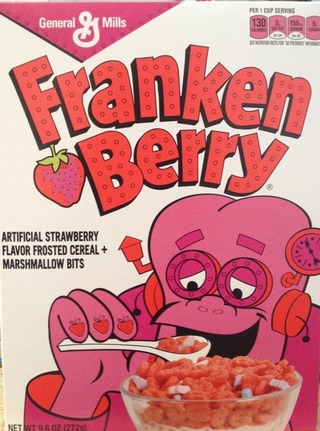The Grammar Dragon
Meet Miss Frankenberry

My Miss Frankenberry had no idea a bright pink cereal with fake strawberry flavoring would eventually be named for her. Or maybe it wasn't. Scientists said the food coloring would turn your poop pink.
My Miss Frankenberry, who actually existed, was shaped like a refrigerator (the old fashioned kind with the round thingy on top), and she wore her hair in a braid that went aroundandaroundandaround her head and was nailed in place with LOTS of hairpins.
The REAL Miss Frankenberry was my high school English teacher. She was always hunting grammar mistakes. We called her the Grammar Dragon.
Here is one that always made her breathe fire: THE MISUNDERSTOOD APOSTROPHE
The APOSTROPHE is the little guy that hangs up there between the n and the t in isn't and between the o and the s in Leonardo's.
The APOSTROPHE has two basic missions in life.
Apostrophic Mission #1. Apostrophe takes the place of a missing letter when two words are pushed together to form a CONTRACTION (meaning that something has been squeezed to make it smaller)
Example: he is -- drop the i, push the two words together, and you get he's.
More examples: they are = they're
there is = there's
will not = won't
it is = it's
should not = shouldn't
cannot, can not = can't
do not = don't
We use these contractions all the time in our speech and in informal writing.
Apostrophic Mission #2. Apostrophe, followed by an s, shows possession: somebody or something possesses something or has something.
Bullwinkle's antlers
Superman's cape
And here's the Catastrophic Apostrophic Mistake that makes the Grammar Dragon completely crazy:
mixing up it's and its.
Its, called a possessive pronoun by the Grammar Dragon, doesn't need an apostrophe: The bird is in its cage.
It's is a contraction, a squeezed form of it is: It's not happy in its cage.
Make a Grammar Dragon happy today and learn the difference between it's and its.
(Other possessive pronouns: theirs, yours, hers, his. No apostrophe!)
NOTE to people who think words are fun: apostrophe is a Greek word meaning "turning away." Weird, huh?